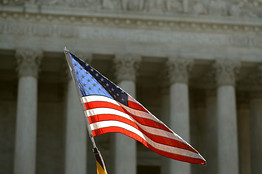A Constitutional Awakening
A bad day for unlimited government at the High
Court.
WSJ.com
Tuesday's two hours of Supreme Court oral arguments on ObamaCare's individual mandate were rough-going for the government and its assertions of unlimited federal power. Several Justices are clearly taking seriously the Constitution's structural checks and balances that are intended to protect individual liberty.
Solicitor General Donald Verrilli faced aggressive questioning from Justices Anthony Kennedy and Antonin Scalia and Chief Justice John Roberts, the trio pegged as possible swing votes in favor of the mandate to buy insurance or pay a penalty. But they failed to elicit from Mr. Verrilli some limiting principle under the Commerce Clause that distinguishes a health plan mandate from any other purchase mandate that would be unconstitutional. The exchanges recalled the famous moment in Citizens United when the government claimed it could ban books to regulate political speech.
"Can you create commerce in order to regulate it?" inquired Justice Kennedy, in the first question from the bench. To ask another way, does the Administration think it has plenary police powers to coerce individuals into economic transactions they would otherwise avoid?
Mr. Verrilli replied that health care is "unique," so Justice Samuel Alito brought up the "market for burial services" and asked if the government could mandate funeral insurance. After all, in the long run we are all dead and thus could transfer the costs of our deaths to the rest of society. (See nearby.)
Mr. Verrilli's error is that even if health care and health insurance were intrinsically different from all other markets—and they aren't—that fact is constitutionally irrelevant. Any federal exercise of police powers is untenable because the Constitution gives such powers to the states.
Justice Scalia bowed at this reality when he asked if having blue eyes would be a meaningful principle limiting the mandate. "That would indeed distinguish it from other situations," he said, but it would also be irrelevant because it would still be "going beyond what the system of enumerated powers allows the government to do."
Justice Scalia returned to this point when he said that apropos of the Necessary and Proper Clause, "in addition to being necessary, it has to be proper. And we've held in two cases that something that was reasonably adopted was not proper because it violated the sovereignty of the states, which was implicit in the constitutional structure."
Those core features of the American system were also stressed by Justice Kennedy. "The government is saying that the federal government has a duty to tell the individual citizen that it must act," he said, "and that is different from what we have in previous cases, and that changes the relationship of the federal government to the individual in the very fundamental way."
Justice Kennedy later expressed some sympathy for the government's claim that young people who don't buy insurance are "very close" to affecting interstate commerce, but the key distinction is that proximity is not enough and can't be enforced by the courts. To regulate individuals at any point in their lives merely because they exist would still undermine the accountability and destroy the dual sovereignty that are the touchstones of his jurisprudence.
***
As it happens, today the Court hears separate arguments on Medicaid, and the themes in that controversy dovetail with those of the individual mandate. Just as the Court may rule that commerce powers are broad but not unlimited, the same is true for the spending power.
Florida and 25 other states contend that ObamaCare's conversion of this voluntary program originally intended for the poor into all-purpose insurance for tens of millions of people is unconstitutional coercion. By commandeering the states and their taxpayers as de facto arms of the federal government, the Administration has abrogated the system of dual sovereignty as surely as it has by claiming police powers.
Medicaid was created in 1965 as a cooperative federal-state partnership. States could opt in, or not, and there were still holdouts as late as 1982. The program has expanded greatly over the years to the point that it is now the largest component of most state budgets. But Governors and legislatures have always had some measure of flexibility and independent control.
The Affordable Care Act obliterates this status quo and forces states to add everyone up to 138% of the poverty level to the rolls. The feds will pick up most of the new costs through 2020, though the states are still on the hook for between $20 billion and $43.2 billion in new costs, and much more into perpetuity.
The Administration says states can reject these huge new liabilities and leave new Medicaid altogether, even as it threatens them with the loss of all federal funds for doing so. But in practical terms that would be ruinous for the local hospitals, doctors, nursing homes and other providers that have adapted to Medicaid's size and depend on the program for revenue. The federal government is giving states a choice between an immediate economic calamity or a unilateral rewrite of the contracts they entered decades ago and eventual calamity as they absorb the new costs. The technical term is extortion.
The Court has always balanced federal and state power by distinguishing between pressure and coercion. ObamaCare crosses that line. The conditions of new Medicaid conscript the states into involuntary servitude to the federal government's policy goals, in this case national health care. They would no longer be independent and autonomous units within the federalist system but agents of Washington.
Judicial liberals have responded to the Medicaid challenge with the legal equivalent of rolling their eyes, much as they did with the individual mandate and the Commerce Clause. On the evidence of Tuesday's oral arguments, that may turn out to be a mistake as well.


